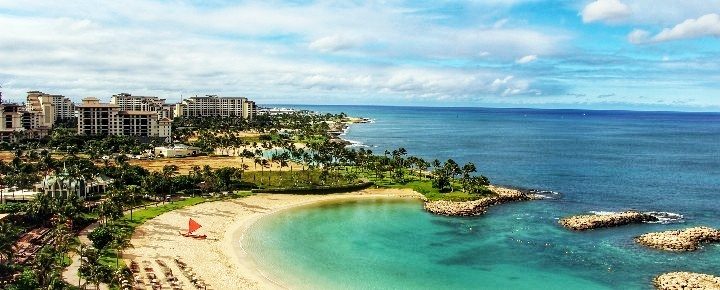Hawaii vacation rentals are back in the news again as House Bill 820 is making its way through the state legislature. The bill, introduced on January 25 and going through committees, calls for a combined tax rate of 33% on Hawaii vacation rentals. Hawaii already has the dubious honor of the highest accommodation tax in the country.
The bill’s authors are working with the Hawaii Department of Taxation to “Ensure that the language in this measure would tax transient vacation units at a rate of twenty-five percent and not 35.25 percent (as originally proposed).” But wait, those aren’t the only taxes on vacation rentals.
Currently the counties each have their own charge of 3%, which brings the total accommodation tax to 13.25%. In addition, there is a 4.17% GST on Maui and 4.712% GST elsewhere in Hawaii. The combined tax on hotels and vacation rentals is now approximately 18%. Based on what Quinlan said about the bill’s intention, it would seemingly increase the total tax on vacation rentals to 33%.
This comes while Honolulu is still in the midst of legal wrangling after a judge blocked for now the city’s desire to convert minimum 30-day rentals to a minimum of 90-days.
House Bill 820, in its entirety, is attached below. One of its authors, Representative Sean Quinlan, wrote:
“Transient vacation rentals continue to be a problem for the State as public discourse and perception have grown more critical of the increasing number of visitors and the impacts of over-tourism. Your Committee believes that the State needs to take a strong stance on holding the tourism industry accountable for the impacts on the State’s resources and residents, such as the lack of housing for residents, as many units that may have housed residents are instead used as transient vacation rentals. This measure will ensure that transient vacation rentals that host visitors for less than thirty days pay their share to address the impacts of the tourism industry on the State.”
This Bill violates the United States Constitution as well as the Hawaii State Constitution. It disenfranchises a certain category of taxpayer. — Hawaii Tax Foundation.
Second, HB820 was initially set to implement the new tax rate effective July 1, 2023. Testimony from the Hawaii Director of Taxation, however, indicated that it would not be feasible to do so and that even an effective date of January 1, 2024, might not be achievable. In the interim, the date was set to June 30, 3000, until this implementation issue can be resolved.
[Hawaii intends to] limit and regulate short-term vacation rentals in neighborhoods and other sensitive areas in our communities. We are generally supportive of state and county efforts to advance that priority.” — Hawaii Tourism Authority.
Misguided and likely not legal.
This pro-hotel and anti-vacation rental bill is clearly discriminatory against legal Hawaii vacation rentals. Many vacation rentals are second homes or investment properties managed by large companies.
The Hawaii Tax Foundation, which is a private, nonprofit educational organization dedicated to informing the public… about the finances of our state and local governments in Hawaii, also testified. They are opposed to the bill on several counts.
1. First, this extra 25% charge is being assessed against only vacation rentals and not hotels.
2. Hawaii’s accommodation tax is, at this time, evenly levied across hotels, timeshares, condos, hotels, and vacation rentals.
3. Additionally, HB820 “only assesses the 25% additional tax on ‘short term vacation rentals’ where the operator is not present (unhosted) and specifically omits all other providers of transient accommodations including a short term vacation rental with a hosted operator (Bed and Breakfast).
4. The position of the Hawaii Tax Foundation is that “This Bill violates the United States Constitution as well as the Hawaii State Constitution. It disenfranchises a certain category of taxpayer from those that are similarly situated. It is discriminatory in that it does not treat all providers of transient accommodations the same.”
Hawaii Tourism Authority testimony.
John DeFries, the state’s Hawaii Tourism Authority head, testified regarding HB820 that “Our community-driven Destination Management Action Plans across Hawaiʻi clearly articulate a desire to manage visitor accommodations – specifically, taking steps to limit and regulate short-term vacation rentals in neighborhoods and other sensitive areas in our communities. We are generally supportive of state and county efforts to advance that priority.”
BOH: What DeFries has issues with, as far as we know, are only vacation rentals in private neighborhoods. This bill seeks to tax even those in approved visitor areas, which is confusing.
Testimony for and against the bill has started.
One person testified that it “Sure looks like Rep. Holt is looking for a career in/by the Hotel industry. Throwing local small businesses under the bus. This bill is dead on arrival. To even suggest such prejudicial and punitive taxation will be challenged in court for sure.”
Another said, “I am vehemently opposed HB 820 becoming law. This motion will only hurt homeowners who supplement their income with renting out rooms in their house by making rental costs so prohibitively expensive for potential renters. We are already charging guests 17.962% and I hear from visitors that the cost of staying in my home with such high tax has made traveling to Hawai’i almost out of reach. I think that the revenue could be raised by taxing hotels at the same rate as STVR’s rather than targeting individual homeowners.”
(BOH: In reading this Bill, it does not apply to bed and breakfast homes).
“You are taxing us to death… The intention of this bill is to further encumber and burden an underserved and marginalized community who provide housing to support our community and our people. We are property owners who provide housing equally to all. By raising the tax and taking away our homeowners exemptions, and not putting a cap on our property taxes, like everyone else has, you have already made it impossible for us to contribute to our community and our families’ survival. We are the locals, the mom-and-pop people who are providing housing to the visitors who support your shops, your schools, our cultural programs, our non-profits, our artists and carriers of culture and your local businesses. With this tax, you are chasing the people of Hawaii away from our land and generations of those before us who hold our culture dear.”
Are you supportive of legal Hawaii vacation rentals?
We are and think it’s a good option for visitors who want more of a home environment during their stay with a private kitchen and offer additional amenities to guests.
HB820_HD1_Get Breaking Hawaii Travel News







I started visiting kapalua Maui 20 years ago. Today the short-term rental tax is in excess of the total amount I used to pay? Where is all that tax money going?
As an owner of 2 and a half months of Timeshare in Hawaii I pay a lot of property tax to the state yearly. I hope this bill will cause people to realize timeshare owners have deeds and also pay our fair share of Hawaii property tax. What’s the point of property ownership if we’re considered transient and taxed again. I’m afraid the HI government is going to strangle tourism. Mahalo@
I find this funny. Why stop at 25%. Make it 50% so Hawaii gets big spending tourists instead of cheap ones. Isn’t that what they want?
This is one of the best comments I’ve read on this site. It is an illusion that vacation rentals will turn into “affordable housing”. But, politicians gotta politic, and being economically literate is not a qualification.
Let’s talk unintended consequences of HB820. If these vacation rental homes are no longer short term rentals:
1. All the jobs like handyman, cleaners, laundry services, etc are now seriously slowed down or out of jobs for locals.
2. The counties will lose tons in property tax which is one of the few taxes that actually stay in the county. My home is taxed at over 3 times what a homestead rate is. For me to be a licensed vacation rental I must pay the tax rate of a vacation rental and not a second home or homestead. This is an instant reduction of county funds of 1/3. And if you think the new 25% tax will make up for it, think again. Those visitors won’t be coming.
Higher unemployment and lower tax revenues. Way to go.
This is one of the best comments I’ve read on this site. It is an illusion that vacation rentals will turn into “affordable housing”. But, politicians gotta politic, and being economically literate is not a qualification.
If homes are not short term rentals don’t think wear and tear will suddenly disappear. I doubt very much that your item #1 would happen. As for #2, gee whiz your rental home isn’t taxed at the homestead rate given to the poor and elderly, that’s such a bummer.
This bill must have come from the hotel industry as they are the only group who will benefit from it. Short term vacation rentals are already restricted to the hotel zones and have no impact on the price of residential housing. Legally STVRs have to be treated the same way hotels are treated. Hotels are non-hosted, typically owned by out of state companies and put exactly the same demands on infrastructure. Average residents would never be able to long-term rent a typical $700K one bedroom condo – where the cost to own it is more than $6,000 per month. And the owner would never be able to use it with a long-term renter.
If the goal is to manage tourism in Hawaii, why not go directly to the source and require tourists to apply for visas to come here? Limit the number of visas issued and charge for them to support the program.
Don’t punish the vacation rental property owners.
Hawaii is a unique state in that our tourist load can be managed. We’re islands. Tourists can’t drive in.
Because it would be blatantly unconstitutionl!
Susan,
Hawaii is not (at this time) a separate country. States cannot require someone to have a visa to enter the state from another state. Believe me, folks in Eastern Idaho would Love to limit visitors crossing the state line from Utah (there is an unflattering nickname for them). But, not going to happen.
Maybe Hawaii should be a separate country again. Hawexit.
Susan W the Visa idea won’t work, it’s simply Unconstitutional to require US Citizens to have one to visit another State. Possibly putting restrictions on certain International Tourism might be allowed But I highly doubt that too. My recommendation is for the Hotels to pull rooms off of the market, raising the rate for availability, and causing a shift away from times when Tourism is High, deferring them to book during the low times. It would take all of the Hotels to work together but they seem to be on other things so why not this.
I believe that by my previous comments I have taken the side of STVO’S and will continue to support them. Any taxation must effect Every Property, not just one type of rental or vacation property as BOH has pointed out. I am taken back to County/City Council directly Lying to the public over the benefits to them if STR’S were done away with, why the Lies? What is the Quid Pro Quo between the Politicians and the Resort/Timeshare/Hotel Industry? It should be a RICO Concern! Where’s the DOJ? It’s time to Stop blaming Tourists and Start Blaming the Politicians and Industry that Is Responsible. Think about That! Put the Blame Where It Belongs!
We have vacationed in Hawaii every year for the last 25 plus years for at least a week each year and love our time in the aloha state but honestly it cost us $10,000 this year and if the state of Hawaii continues to increase the tax on visitors we will be forced to go elsewhere for vacation and spend our hard earned money there. Please respond and we will be happy to answer any questions.
Agree, my extended family chose San Diego last March for our 2 week get together. We felt so welcome! Great weather, beaches we felt we could go on and enjoy, palm trees, great food etc. Much shorter and cost effective flight! We are planning San Diego this year for a return trip thinking we will never return to Hawaii. Why go where you are not wanted is our view. Hawaii got what it wanted from our 4 families.
Honestly, go someplace else. The only thing cheap about going to Hawaii is airfare. Hotels are really expensive. Car rentals are outrageous. Food costs a lot as well. You can spend a little more on a flight, for example, Bali, but everything else will be much cheaper. It’s beautiful there. Just one example.
Yes, Hawaii does not have a corner on beauty by a long shot, but we seem to think we do, judging by the attitudes.
You just verbalized what is already happening. Cabo for 2 months or Hawaii for a week? I want to know where all the new tax money is going???
For all the tourists who are threatening not to ever visit again, that’s the point ! Hawaiians are sick of overtourism and the damage it causes to our islands. There will still be plenty of visitors coming and the state gets extra revenue for local programs.
And if you are an owner complaining about lost income, especially if you live on the mainland, how about you tell us about how many $100,000’s your unit has appreciated in value because visitor numbers are at a record !!!
We got your point, thanks. Loud and clear. We will not be back.
Yes, Ainakea, thanks for representing the point of view of the islands so eloquently. Our visitors will stop coming, and we can be left to damage our islands, have wild parties in our neighborhoods, trash our streets and the beaches, have drag races on our roads, and drive drunk down our highways, all on our own.
Just don’t come to the council meetings complaining about lack of revenue and the tripling of your taxes. You had your chance, but chose lack of aloha instead.
It seems that so many people have all of the answers. Have you considered Why there is an explosion of new construction occurring across the counties? Why all of the Timeshares are being built? I’m Certain that you all have been living under the delusion that tourism will be reduced permanently, so then why do you need more hotel rooms and timeshares?
Ainakea R do you actually realize what it must be like to have a wonderful home which you rent out certain times of the year? I doubt that you do. Imagine being limited by restrictions on how long you Must rent the property And how many times per year. Your rental no longer appeals to most tourists so you lose income, plenty of it. You pay Much Higher property taxes and must pay license fees. Average people couldn’t afford to rent/lease the property and lowering the price isn’t possible. That’s what has and is happening. You have no idea what you are talking about, sincerely.
This proposed legislation is illegal at best. What is worse is the legislators wasting time and taxpayer money proposing these type bills that clearly violate the State and countries constitution. Strongly suggest voting for individuals that have kindergarten level understanding of the law. Tax money can be more wisely spent.
Have to agree with you, legislators, in general, seem to love wasting time and money on legislation that has no chance of passing.
Sincere question: how would this be a constitutional violation?
The position of the Hawaii Tax Foundation is that “This Bill violates the United States Constitution as well as the Hawaii State Constitution. It disenfranchises a certain category of taxpayer from those that are similarly situated. It is discriminatory in that it does not treat all providers of transient accommodations the same.”
We throughly enjoyed staying at a vrbo home rather than a hotel. It allowed four different households to be in the same place and not bother anyone with our time schedule. It also allowed us to mingle with the locals rather than being in high tourist spots every day. We paid about the same if not slightly more to stay at the house in Keaau. And it allowed us to use the small businesses like local grocery stores, farmer’s markets, and restaurants every day. We would like to come back and visit these beautiful islands and have the same situation that we had rather than give money to greedy cooperations with hotels taking up beach real estate.
Ok, well Hawaii, just be clear. I’m fine to find somewhere else. For years now I’ve really enjoyed the ability to rent a condo for 3-4 weeks a year and immerse into your lovely islands. If I have become a burden and you need to add 30% lodging tax on top of the car rental taxes etc, ok I get it. Sorry, hotel stays are not an option for me, not into that, and no way I am going to buy into a time share, so Yes such a tax prices me out of Hawaii, but I get it. Sorry the price and taxes now are excessive, go higher… sorry its over I will miss you.
Aloha
It’s not that they need to have all these fees, they have plenty of money already. Maui budget this year is 1 billion dollars, for 150,000 residents, with visitors paying the vast majority of it.
The fees are being raised because money talks. It’s the only thing the government can think of to keep you away.
With a budget of One Billion Dollars, basically all Tourism Funded, Maui should want for Nothing. Reasonable Housing should be plentiful and the Hawaii Homeless on Maui should be fully and properly Housed. With the Unbelievably Large Remainder of Money every problem and project should be completed fully. After that, each year the minor upkeep needed should be minimal and Budgetary Reserves immense. What is difficult about this? That’s just a blueprint for success, instead watch what happens.
That is such a sincere Good Bye, I too understand where you’re coming from and probably where you will be going to. Maybe one day we will cross paths never knowing it! When getting a “loan” from a loan “Specialist” so to speak (think great white) is less costly than a night’s accommodation in Hawaii, you know that something is Smelling Sour in the 50th State. Good Luck in your new vacation ventures, compared to Hawaii you’ll be able to afford several!
Glad I have stopped going to Hawaii. This once beautiful place now does not welcome visitors. Attitude is so poor and with money grabbing everywhere. I now go to San Diego. Beautiful, welcoming palm trees and much cheaper flights.
I’m a Native Californian and I like San Diego but it will never compare to Hawaii in my humble opinion.
Well. I guess you politicians would rather our islands be rid of all tourism so us locals can go back to grass huts and coconuts. Tourism is our lively hood. It’s not the tourist fault that the state and counties mis use what funds are collected to improve infrastructure. We have lived with consistent droughts, one way in and out of Lahaina. No alternative routes to avoid major accidents. One hospital
I could go on. Born and raised here. And our islands are an embarrassment. The greed is incredible and for what?! No wonder locals moving to Vegas, Arizona, Texas. What..no other solution?!
Exactly, I have been going to Maui since 2008 and in all that time I have yet to see where my text dollars have gone, the roads still suck, they flood often and have big potholes, I think that all the taxes going to the politicians pockets because they sure aren’t fixing anything
Hotels were built to house tourists. Give the neighborhoods back to the people who live and work here. Disgusting to buy a second home so u can get visitors to spend 5000 a week. There is no homes for residents. Glad u get the tax rate up, should just ban the vacation rentals in residential areas. Minimum 90 day rentals with rent control is next step. You come to visit just to force workers to do two or three jobs to afford insane prices of limited rental possibilities. Don’t expect any kindness in return.
@Kittey… So you think if All the STR stopped and were put on the market for sale the locals could afford them?
Came here to ask the same. The problem is obviously no new affordable housing being built, but of course it’s much easier and more satisfying to blame luxury condo and homeowners than our own government. Great job; let’s keep voting them in!
This bill reads like it was created by the hotel industry and is incredibly naive. It will make the vacation zone condos less competitive with the homes in non-vacation zone areas (which are exactly the properties people want to rent long-term), resulting in the opposite effect the authors are intending. It is unlikely that any of these vacation zone condos will become long-term housing for residents. It is more likely that they will sit empty and places like Kona will lose a lot of sales tax and tourist revenue since there are so few hotels.
There are better ways to address the issue of housing costs.
Yes, in fact, the recent quadrupling of taxes on condo owners here that could potentially rent out their units short-term, has forced them to start renting out short-term when they never have before just to pay the taxes! More units for more visitors! Unintended consequences sometimes bring us the opposite of what we want, and we deserve it!
I am so sorry to hear this. I have b een visiting since the 70’s. Very respectable and honored the land and its people. Last year, was a Maui mecca and although tourists were unintelligent about how they were raised (some)….many were not, but the the posts on social media have spooked me right off the islands. They are threatening and bullies and should be stopped, but now they will be happy as their island shrinks. I shall not return as this triple increase on rentals is out of my wallet. What a shame, it was my and always has been my dream to enjoy my golden years on this beautiful island. I do cry. Izzy makes me cry and he is crying in the heavens.
Keep it up Hawaii, you will eventually kill the goose that laid the golden egg. Tourism is your industry. We have been coming here for over twenty years and this is our last. Prices are getting out of hand and the spirit of aloha is being replaced by greed and disrespect for visitors.
Thanks but no thanks, we’re done
Hi ,
Perhaps the push to prevent the local citizens to use their home for vacation rentals is being strongly advocated by the hotel industry to prevent the “small” businessperson from earning a living. Are Politicians getting “feedback” dollarwise, therefore not helping their constituents?
This bill will further erode visitors who would like to visit Hawaii. Look at the loss of restaurants and the jobs already
No jobs means no income how will that improve the local economy
Our family has come to the conclusion that Hawaii does not really want tourists….. just our money. We have been vacationing in Hawaii since the 80’s and since COVID we have felt very unwelcomed. You want our money but you barely tolerate us. We will be vacationing in Europe from now on. Aloha.
No more airbnbs.
Unless host lives on the property.
In which case it’s not a rental property really.
Airbnb started as a place for people to share a hosts home now it’s just a bunch of greedy people buying up extra homes taking things away locals would use. Airbnb needs to be stopped tax them to death till they lose interest and it’s not worth it.
Stop booking. Seriously airbnbs sometimes even rent regular apartments not just buy homes just to Airbnb it out its horrendous what we’ll do to make money in this country. Like who cares if locals have a place to rent and live and work. I hope locals all get pushed out and there’s no one left to serve all these tourists.
Tax them to death.
Airbnb has nothing to do with anything. There have been thousands of vacation rentals here since the 1950’s, long before Airbnb, even before we were a state. Why do you think you are able to remain here at all?
The ignorance on these islands is astounding.
Wow! I know that Hawaii wants our money but doesn’t really want us there but this is over the top.
I wish some Visitor Education could become a thing; I’m a recycler, don’t waste water, am aware of which sunscreens are safer for the oceans, try to be culturally sensitive and aware, etc. Some people don’t care about these things.
By the way, your pop-up ads cover a lot of your page content and are making the site increasingly difficult to read. But it’s the best true-facts Hawaii site I know of, mahalo!
Does HB820 tax apply to condo rentals by owner, by vrbo?
Yes, it would apply to any short-term rental on the islands.
It is interesting that they are not addressing how the additional revenue wold be spent. If there argument is that homeowners are using there property as a vacation rental and not being used as a long-term rental well, it would appear to me that is within the owner’s rights. The state is already taxing the heck out of not only visitors but also their citizenry. Over taxation is only one of the issues. The residents of this state have really never exercised their rights in holding the state and local governments responsible and have just allowed them to do as they please. They truly don’t realize that there is power in numbers to make changes so that the state would not be compared to other “third world countries”.
They are not overtaxing their citizenry. Hawaii is the #1 state for lowest resident taxes in the nation.
At the same time, Hawaii has one of the highest accommodation taxes in the nation.
Our visitors essentially pay us to live here.
Just when you think you’ve heard the ultimate in lunacy/greed we hear yet another story that’s even more absurd. As pointed out, Hawaiian taxes are already the highest in the U.S. with every entity having their hand out to fleece the tourism industry. GET tax, TAT tax, County tax not to mention the already resident property tax and sales tax. Is there any end to the greed? And at what point to folks push back and decry “Enough”.?
If the point is to continue to tax until tourism dries up and blows away, I’d say you are on the right track as we’ve read numerous contributors tell us that they are looking elsewhere for their next vacation solely due to the costs to take their family on vacation. Very bad thinking indeed.
And at what point to folks push back and decry “Enough”.?
Every election year you can push back! But you keep electing the same people over and over, you keep getting the same result. Insanity? Next election vote for “the other guy”. But until you change your government, things will always be the same. FYI, politicians, regardless of party, do not care about you.
I believe that taxation is the wrong mechanism to achieve the desired goal. It would be far better to make it easier for counties to zone areas where transitory vacation rentals can be located. The objective being to allow residents to enjoy their homes without the traffic and activity being brought into their residential area and to allow those who find vacation rentals better meet their needs to enjoy the islands. As a personal belief I think enforcing a requirement that vacation rentals companies renting in Hawaii should be based in and operate from Hawaii and that way extra revenues could be gathered by the State.
What makes you think the traffic and activity you see from short-term renters would be any different than the traffic and activity you see from long-term renters? In fact, parties and multiple cars in driveways are much more prevalent with long-term renters, and they won’t be leaving in a few days, so you are stuck with them. Not to mention the run-down appearance of long-term rentals, creating blight in the neighborhoods.
Short-term rentals are very well kept up. They have to be to attract renters. Be careful what you wish for, and solve the right problems in the right way. Build more affordable housing!
I live in an area affected by STVRs. They bring pretty constant traffic, loud groups and add nothing to the neighborhood feel.
I like to stay in condos but only in vacation areas. Local neighborhoods are no place for holiday merry makers.
I live in an area “affected by STVRs” too, and I don’t get it. How do visitors make More traffic and bring More loud groups than long-term renters, or even owners? Visitors don’t know anybody to bring!
I love visitors to our islands. They are so eager to experience the advertised aloha, and I love seeing all of their happy faces enjoying their vacation of a lifetime. Makes me very proud to call this my home.
PatG your right, but that is the problem at the same time, so Who is making up these incidents to support the closures of STR Properties by overburdening regulations and obscene taxation? Unfortunately the immediate “Who” in this case might be traced back to the Same People that Lied to residents and the Houseless about STR Properties taking away affordable housing from them, the County Commissioners. Done for voter support for their new plans against STR’S they needed Vocalized and Irate People to back them, thus the Lies! In the end, without STR’S, Who Benefits Most? Hotels/Timeshare/Resort Industry. Collusion is much more than a word in Hawaii!
More Hawaiian Buffoonery!
Our police are inept and corrupt.
The state cannot police the police.
The legislation cannot ever find solutions to simple issues such as these,as they are too busy worrying about their next pay increase.
And so it goes,and goes and goes.
Truly the most embarrassing state to live in in our entire union.
They can double dip and rob the state & Hawaiians blind like they’ve done for 30 year’s.
Your all fired!!
Have your desks cleared by 4:00 and out of the building.
What a perfect display of disillusionment, anger, and despair. Some will agree, like I, yet knowing it isn’t that easy to accomplish. The Voters could have, should have, begun replacing them several months ago but didn’t. That is the quickest and most direct way, now convince them to do it. Things won’t change, they may even become more blatant and worse, unless Voter’s mindsets can be. Then hold every politician accountable, force true and lasting change to government at Every Level. Accountability must occur!